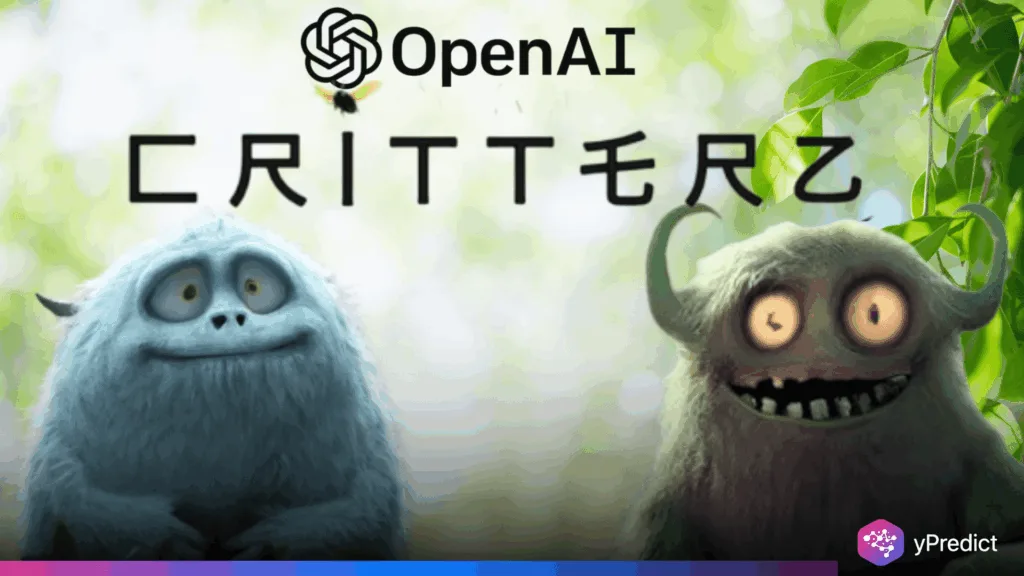
OpenAI is making a move toward strategic filmmaking with its upcoming AI movie debut, Critterz. So, this movie’s actually hitting the big screen at Cannes in May 2026. Kinda wild, right? Feels like a huge deal. Honestly, it’s like AI just walked in and entered the center of the film industry, lurking more in the background.
OpenAI’s AI Movie Debut Sparks New Creativity
Three years back, Critterz started as a short film experiment by Chad Nelson, a creative lead at OpenAI. The DALL·E image generator is a key tool in their process. This AI movie debut project received a positive response. So, the team decided to expand it into a full-length feature. Now, with Vertigo Films and Native Foreign on board, their objective is to highlight AI’s evolving role in the film industry.
The production timeline is dramatically compressed, just nine months, compared to the years that animated features typically require. And the budget? Less than $30 million. Thus, that’s a fraction of what major Hollywood studios usually spend. The use of OpenAI‘s advanced technologies at critical points in the workflow contributes significantly to operational efficiency.
Now, about the Critterz AI film: a bunch of woodland critters living their best lives until strangers show up and start shaking things up. Suddenly, the whole forest is buzzing with tension. The outsiders are triggering an adventurous journey. The screenplay is crafted by James Lamont and Jon Foster. They are blending AI-driven visuals with established screenwriting talent to produce a commercially viable, compelling animated film.
Will AI Tools Replace Traditional Animation Processes?
OpenAI’s involvement in Critterz is making waves in the film world. Additionally, advanced AI platforms such as GPT-5 and DALL·E are transforming studio production practices. They are reducing expenses, shortening schedules, and increasing overall efficiency. These AI tools can do anything from creating images to writing dialogue and even assist with voice modulation. Thus, it’s a smarter, leaner workflow, and the impact is already obvious.
Yet the human element is still at the forefront. These AI systems are collaborating with voice actors, artists, and creative professionals. The key here is to provide creators with the necessary technology to deliver more and do it better.
This collaboration? It’s genuinely raising the bar, setting a fresh benchmark for creative excellence and operational efficiency in filmmaking. Critterz’s Cannes Film Festival premiere is a calculated move. It places this innovation on a global scale and indicates the industry’s growing confidence in AI projects.
AI Movie Debut Shows Filmmaking Future Possibilities
Critterz is honestly a clear sign of how quickly the film industry is shifting gears. With AI getting smarter by the minute, it’s making itself at home. So, if the Critterz AI film succeeds, don’t be surprised when studios start betting big on AI-driven productions.
AI has the potential to drastically change how films are adapted for audiences. The content is not based solely on what executives think will work, but rather on people’s actual preferences. Audiences want variety, and companies benefit from providing it.
Still, challenges remain. Navigating ethical questions, copyright concerns, and the ongoing conversation about preserving genuine creativity isn’t exactly straightforward.
Could Critterz Change the Future of AI Films?
The Critterz AI film is right at the heart of where technology and storytelling collide. It’s getting a lot of attention as a standout example of how AI can shake up the film industry. With its Cannes premiere on the horizon, the project is prompting industry players to take a hard look at how we define creativity in today’s cinematic landscape.
If Critterz works well, we could be seeing the start of a game-changing trend. Plus, AI and humans are working side by side to create stories that resonate and push boundaries. The future of filmmaking? It’s getting a serious tech upgrade.






